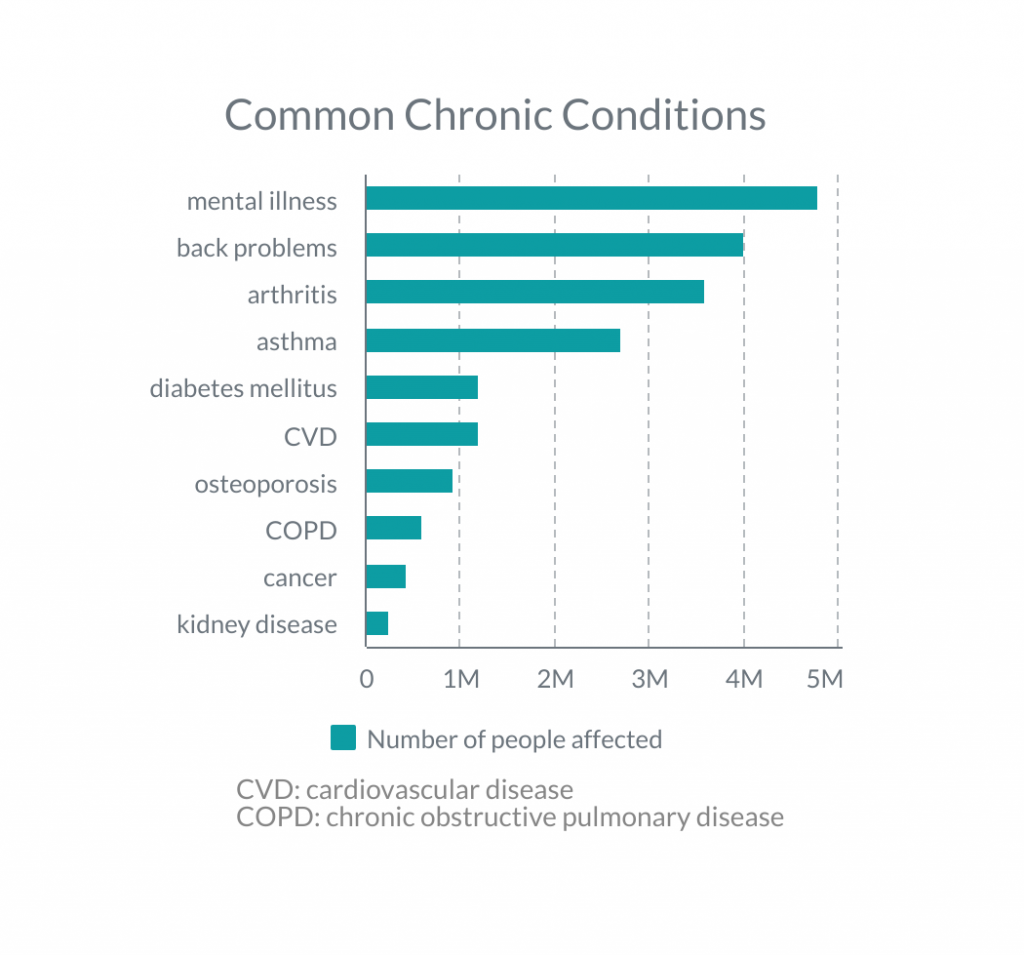What are your 2021 Health Resolutions?
Some people love New Year’s resolutions. A New Year, with new goals, opportunities and challenges! A clean slate.
Some people hate them. After all, New Year is an arbitrary date which is no different to any other day. What’s more, most people break their New Year’s resolutions by halfway through January!
Whether you feel compelled to set goals now or not, it’s worth standing still for a moment and taking stock of 2020.
Obviously, the biggest health story in Australia in 2020 was COVID-19. But do you know the other big health issues facing Aussies? According to the Health Department the following chronic conditions—responsible for 9 out of 10 deaths in Australia—affect around 14 million Australians:
- mental and behavioural conditions – 4.8 million people
- back problems – 4.0 million people
- arthritis – 3.6 million people
- asthma – 2.7 million people
- diabetes mellitus – 1.2 million people
- heart, stroke and vascular disease –1.2 million people
- osteoporosis – 924,000 people
- chronic obstructive pulmonary disease (COPD) – 598,800 people
- cancer – 432,400 people
- kidney disease – 237,800 people

We can prevent or improve the outcomes of many of these conditions with changes to our lifestyles.
Here, we take you through the main things you could change in 2021 that can improve your life, or even save it.
Stop smoking
Stopping smoking can provide major health benefits in both the short term and the long term. In fact, your health can improve as soon as you stop smoking.
Did you know that after you quit smoking:
- your sense of taste and smell improve, and most nicotine is out of your body within the first month
- your lung function and blood flow improve, and your risk of heart disease has halved in the first year
- your risk of heart attack and stroke is almost the same as that of a person who has never smoked after 15 years?
Learn more about quitting methods and get help along the way.
To speak with an InstantScripts Doctor:
Request a ConsultationIf you have run out of your script:
Request a ScriptLimit drinking
Professor Paul Kelly, Australia’s Acting Chief Medical Officer, tells us:
“Every year there are more than 4,000 alcohol-related deaths in Australia, and more than 70,000 hospital admissions. Alcohol is linked to more than 40 medical conditions, including many cancers.”
To reduce the harm from alcohol, the National Health and Medical Research Council now recommends:
- healthy men and women should drink no more than 10 standard drinks a week and no more than 4 standard drinks on any one day. The less you drink, the lower your risk of harm from alcohol.
- children and people under 18 years of age should not drink alcohol.
- women who are pregnant or planning a pregnancy should not drink alcohol. For women who are breastfeeding, not drinking alcohol is safest for their babies. This prevents harming an unborn child or infant.
“Following the guidelines keeps the risk of harm from alcohol low, but it does not remove all risk. Healthy adults drinking within the guideline recommendations have less than a 1 in 100 chance of dying from an alcohol-related condition.”

Oi, get a move on!
Sedentary lifestyles can double the risk of death from cardiovascular diseases, diabetes, and obesity. And with two-thirds of Australians overweight or obese, these risks are now affecting a huge number of our population.
Health authorities around the world recommend just 30 minutes of walking every day to help:
- improve cardiovascular fitness
- strengthen bones
- reduce excess body fat
- boost muscle power
- boost endurance.
“Walking is hugely underrated as a powerful prescription for good health, and [the] latest research shows how beneficial it can be in lowering your risk of heart disease,” says Professor John Kelly, CEO of the Heart Foundation.
Don’t stop it, swap it
A New Year is a great time to start a healthy eating habit. And the good news is that simple food and drink swaps can make a big impression on your health.
Here’s how it works. Simply swap high-sugar, high-fat or salty foods for healthier alternatives. For example, you can swap:
- from whole milk to light or skim milk
- white breads, bagels and muffins for wholegrain varieties
- creamy or cheesy sauces for tomato- or vegetable-based sauces on your pasta, meat or fish dishes
- sausages for leaner cuts of meat (e.g. steak)
- sugary drinks for a glass of water
- an iced coffee for a small fruit frappe.
We hope this guide gets you started on your way to a healthier life in 2021.
Happy New Year!
© InstantScripts
Level 8 / 637 Flinders St.,
Docklands VIC 3008

